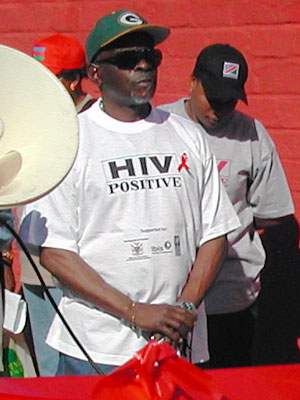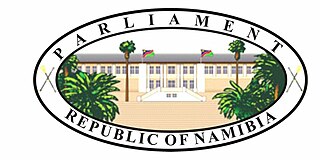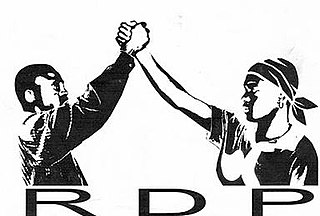Related Research Articles

Politics of Namibia takes place in a framework of a semi-presidential representative democratic republic, whereby the President of Namibia is both head of state and head of government, and of a pluriform multi-party system. Executive power is exercised by both the president and the government. Legislative power is vested in the two chambers of Parliament. The judiciary is independent of the executive and the legislature.

Theo-Ben Gurirab was a Namibian politician who served in various senior government positions. He served as the second Prime Minister of Namibia from 28 August 2002 to 20 March 2005, following the demotion and subsequent resignation of Hage Geingob. Previously he was the country's first Minister of Foreign Affairs from 1990 to 2002, and was President of the United Nations General Assembly from 1999 to 2000. He was Speaker of the National Assembly of Namibia from 2005 to 2015, when he was replaced by Peter Katjavivi. Gurirab ultimately resigned from politics in 2015.
Hidipo Livius Hamutenya was a Namibian politician. A long time leading member of the South West Africa People's Organization (SWAPO), Hamutenya was a member of the Cabinet of Namibia from independence in 1990 to 2004, serving in several important ministerial portfolios. He was defeated in a bid for the party's presidential nomination in 2004 and left SWAPO to form an opposition group, the Rally for Democracy and Progress (RDP), in 2007. He was elected to the National Assembly of Namibia with RDP in the 2009 general election. He was forced to step down as RDP president on 28 February 2015 and rejoined SWAPO on 28 August 2015.

Hifikepunye Lucas Pohamba is a Namibian politician who served as the second president of Namibia from 21 March 2005 to 21 March 2015. He won the 2004 presidential election overwhelmingly as the candidate of SWAPO, and was reelected in 2009. Pohamba was the president of SWAPO from 2007 until his retirement in 2015. He is a recipient of the Ibrahim Prize.

Elections in Namibia determine who holds public political offices in the country. Namibia is a semi-presidential representative democratic republic. It runs direct elections every five years for the position of the president and seats in the National Assembly, and every six years for the Regional Councils and the distribution of seats in local authorities. The National Council is elected indirectly by the constituency councillors of Namibia's 14 regions.

Nahas Gideon Angula is a Namibian politician who served as the third Prime Minister of Namibia from 21 March 2005 to 4 December 2012. He was succeeded by Hage Geingob in a cabinet reshuffle after the 2012 SWAPO Party congress. He subsequently served as Minister of Defence from 2012 to 2015.
Katuutire Kaura was a Namibian politician. He was president of the Democratic Turnhalle Alliance (DTA) from 1998 to 2013 and was the official leader of the opposition from 2000 to 2005.

The Popular Democratic Movement (PDM), formerly the Democratic Turnhalle Alliance (DTA), is an amalgamation of political parties in Namibia, registered as one singular party for representation purposes. In coalition with the United Democratic Front, it formed the official opposition in Parliament until the parliamentary elections in 2009. The party currently holds 16 seats in the Namibian National Assembly and one seat in the Namibian National Council and is the official opposition. McHenry Venaani is president of the PDM.
The United Democratic Front (UDF) is a political party in Namibia. Justus ǁGaroëb founded the party in 1989 and led it until 2013. He was succeeded by Apius Auchab.

The Republican Party is a political party in Namibia. It is based among the white minority. Henk Mudge was its President and its sole representative in the National Assembly. Prior to the 2004 parliamentary election, the Republican Party was part of the Democratic Turnhalle Alliance (DTA). It was revived as an independent party in 2003, and won 1.9% of popular votes and 1 National Assembly seat.

Hage Gottfried Geingob is a Namibian politician, serving as the third president of Namibia since 21 March 2015. Geingob was the first Prime Minister of Namibia from 1990 to 2002, and served as prime minister again from 2012 to 2015. Between 2008 and 2012 Geingob served as Minister of Trade and Industry. He is also the current president of the ruling SWAPO Party since his election to the position in November 2017.

The Parliament of Namibia is the national legislature of Namibia. It is a bicameral legislature and, thus, consists of two houses: the National Council and the National Assembly.

The National Assembly is the lower chamber of Namibia's bicameral Parliament. Its laws must be approved by the National Council, the upper house. Since 2014, it has a total of 104 members. 96 members are directly elected through a system of closed list proportional representation and serve five-year terms. Eight additional members are appointed by the President. Since 2015, SWAPO member Peter Katjavivi has been the Speaker of the National Assembly.
Benjamin Ulenga is a Namibian politician. In the 1990s, he served under the SWAPO government as a deputy minister and as an ambassador, but he left SWAPO in 1998 and founded an opposition party, the Congress of Democrats (CoD), in 1999. He was a member of the National Assembly of Namibia from 2000 to 2015 and led the CoD until 2015.

The Rally for Democracy and Progress (RDP) is a political party in Namibia. It was launched on 17 November 2007 under the leadership of Hidipo Hamutenya and Jesaya Nyamu, both former leading members of the ruling SWAPO party and cabinet ministers. Hamutenya had unsuccessfully sought the SWAPO nomination for President in 2004. At the time of the RDP's launch, it was considered to represent the strongest challenge to SWAPO's political dominance since the country gained its independence in 1990. According to Hamutenya, speaking at the RDP's launch, the party was "born in response to our people's deep longing for a vision, political direction and the rekindling of their hopes and aspiration for a better and prosperous future".
Karl Otto Ludwig Klaus Dierks was a German-born Namibian deputy government minister, a transport planner and civil engineer in Namibia.

Henry Ferdinand Mudge is a Namibian politician and President of the Republican Party. He was the party's only member of the National Assembly of Namibia from 2004 to 2011, when he resigned.

Peter Hitjitevi Katjavivi is a Namibian politician who is the Speaker of the National Assembly of Namibia since March 2015 and the chancellor of the Namibia University of Science and Technology from 1992 to 2003. Previously he was the founding Vice-Chancellor of the University of Namibia from 1992 to 2003, Ambassador to the European Union from 2003 to 2006, Ambassador to Germany from 2006 to 2008, and Director General of the National Planning Commission from 2008 to 2010.

General elections were held in Namibia on 27 November 2019. Ballots were cast using electronic voting. A total of eleven candidates ran for the presidency and fifteen political parties contested the National Assembly elections.

Mexico–Namibia relations are the diplomatic relations between the United Mexican States and the Republic of Namibia. Both nations are members of the United Nations.
References
- ↑ Profile [ permanent dead link ] from the National Assembly of Namibia
- 1 2 Biography Archived 11 June 2011 at the Wayback Machine at the Namibia Institute for Democracy